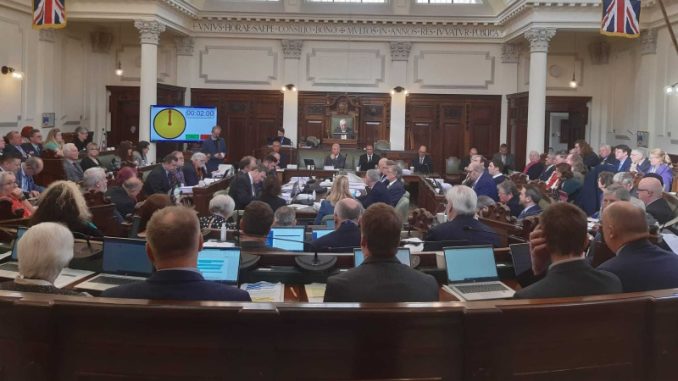
The leaders of the county council which has remained under Conservative stewardship for decades have dismissed proposed changes to its constitution purportedly levelled to better hold the ruling administration to account.
A full meeting of North Yorkshire County Council, which has been run by Tories for all but eight of the last 50 years, saw the authority likened to the Russian parliament under Vladimir Putin as opposition members vented frustration over the level of control Conservatives exert over meetings.
The meeting heard while the Conservatives only attracted 41 per cent of the votes at last May’s elections, the political group held 100 per cent of the posts on its decision-making executive, control of all but one of its watchdog-style scrutiny committees and was now looking to restrict the time opposition members could ask questions.
Leader of the opposition, Councillor Bryn Griffiths, told the meeting proposals for the county council’s successor unitary authority’s constitution contained clauses that would limit the quarterly question time for the authority’s leader to ten minutes and to five minutes to other executive members.
The Liberal Democrat group leader said democracy was effectively being “guillotined”, leaving sufficient time for only two or three questions to be answered, and no time for follow-up questions.
Coun Giffiths said the Tories’ concession to publish councillors’ questions and the council’s answers on its website was welcome, but it was “not an alternative to democratic questioning and scrutiny in the council chamber and in the public forum”.
Green group leader Councillor Andy Brown told the meeting elected members had a right to have their voice heard and that should not come at the gift of the ruling group.
He urged the Conservatives to give opposition members “the chance to ask sensible questions for a reasonable time”.
Coun Brown added: “I know nobody here wants to establish a Soviet-style parliament, but if you’re not careful this resembles very much the kind of rule that exists in the Russian parliament at the moment to curb debate. If you vote for it all you will be doing is forcing the opposition to work more closely together.”
The meeting also heard opposition calls for more of the council’s scrutiny committees to be lead by councillors who are not in the administration’s party, but Conservatives rejected claims they were “marking their own homework” and argued they had an open transparent system of scrutiny that had worked well for many years.
A move to end notices of motion to full council being referred to the council’s executive without debate was also voted down by Conservatives, who argued the proposal would lead to inordinately long and unfocused meetings.
However, the meeting heard the proposed constitution would give about 90 minutes for councillors’ questions.
The authority’s deputy leader, Councillor Gareth Dadd, said the constitution would be reviewed in a year.
He said rather than having to wait for the quarterly full council meetings to ask questions, the proposed system would enable members to ask questions immediately and get a response from executive members within ten working days.
Coun Dadd said by publishing councillors’ questions and responses to them the unitary authority would operate “a more modern way of doing business”.
Both Coun Dadd and other executive members underlined that the council chamber was about debate and holding the executive to account, rather than raising very parochial issues, and the constitution aimed to “protect the integrity of the council chamber”.


Be the first to comment